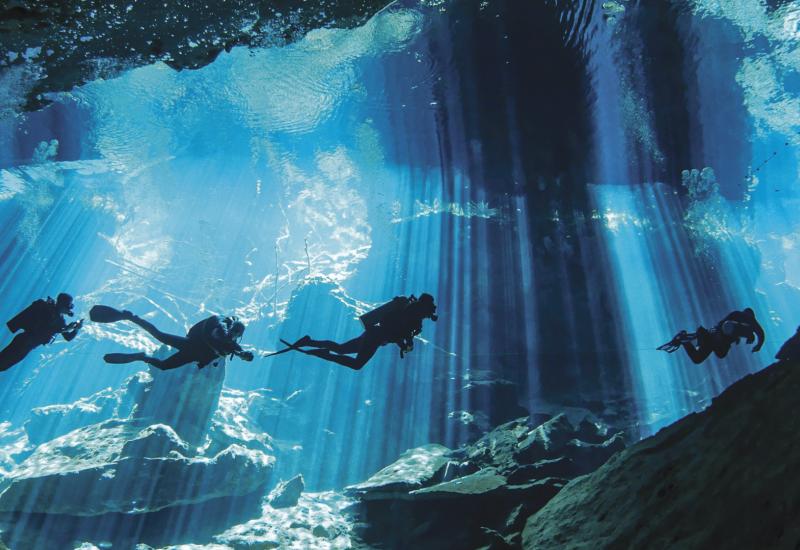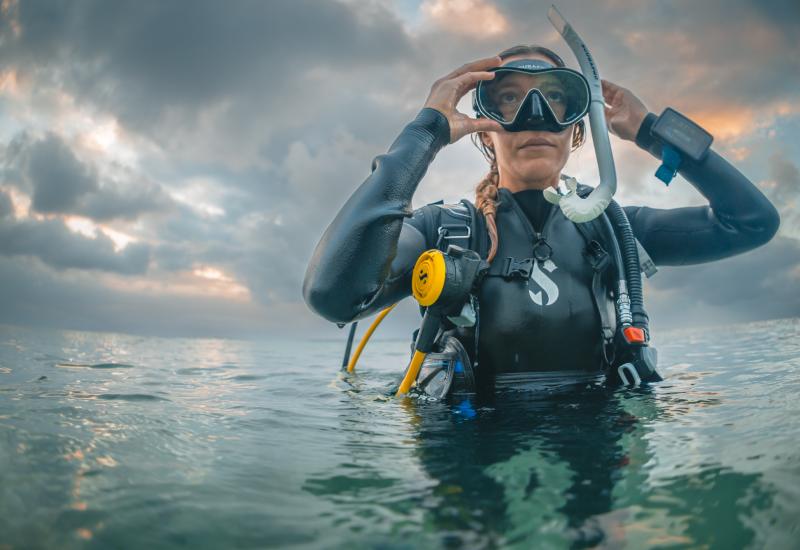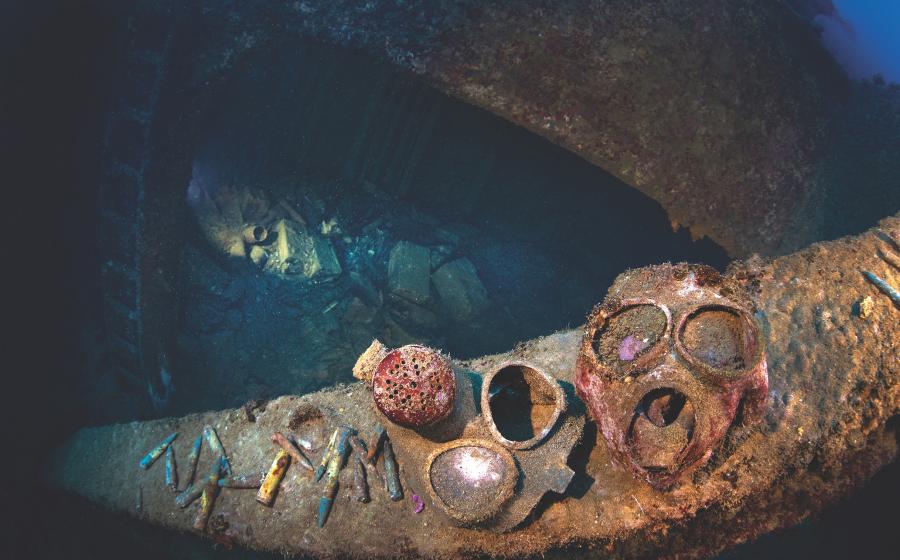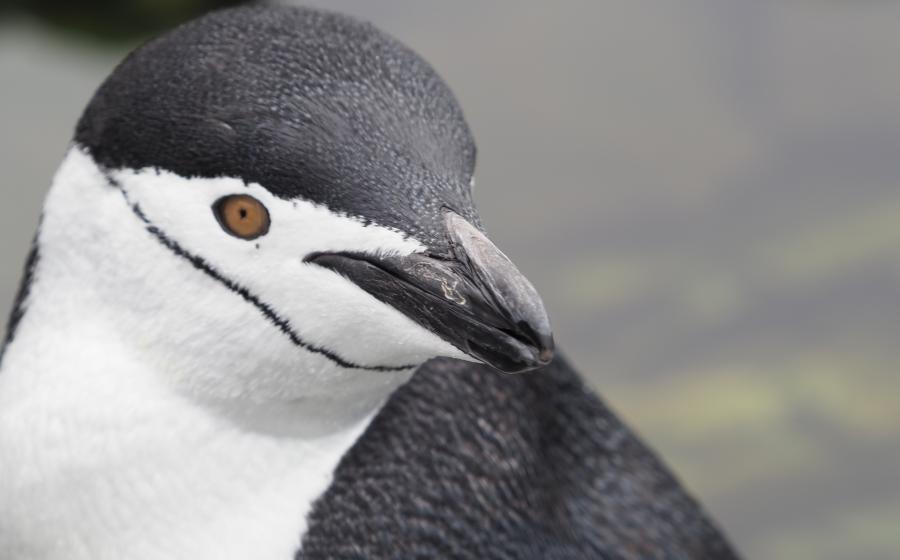I'm From the Shark Bite Capital of the World. Here's Why I Love Diving with One of Nature's Most Misunderstood Predators
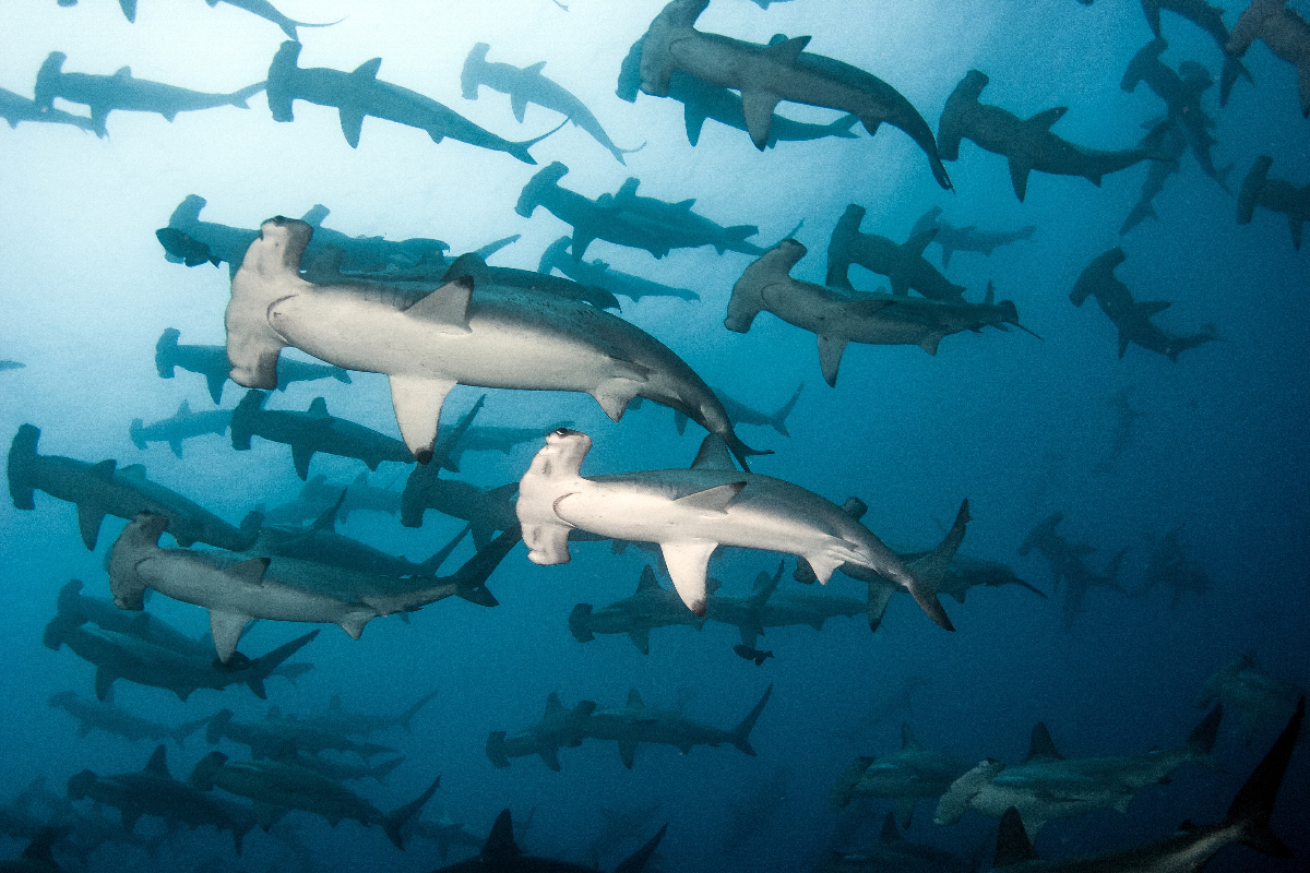
Shutterstock.com/Tomas KotoucA school of scalloped hammerheads passes overhead.
“Will we see sharks?”
When I first started scuba diving, that was my default question, tentatively posed at each and every new dive site. Most instructors misunderstood why I was asking, responding with a cheerful, “If we’re lucky!”
Having grown up in a family of surfers in Volusia County, Florida, a destination once awarded the dubious distinction of "Shark Bite Capital of the World,” I used to be terrified of shark attacks. My fear prevented me from wading more than ankle deep into the shallows, convinced that a great white—in an act of miraculous athleticism and unexplained malice—would somehow leap out of the sea and swallow me whole, Quint-style. I imagined a thousand razor-toothed fish circling beneath the surface, simply waiting for their chance to strike. While I never knew anyone to actually experience human-shark conflict, my dad and brother frequently noticed bulls and blacktips from their boards. That was enough nightmare fuel (along with some not-so-subtle influence from movies and television) to keep me firmly on land until my thirties.
Then I discovered diving. On a fateful trip to the Mesoamerican Barrier Reef System, I realized that my nerves relaxed if I could see what was (or wasn’t) prowling just under the waves. Entranced by kaleidoscopic tropical fish and wizened sea turtles, I fell in love with the simultaneous calm and excitement of floating weightlessly through the water column. Most importantly: There wasn’t a shark in sight.
Gradually, my attitude—and luck—began to shift. While traveling in Fiji, I spotted my first shark, a sheepish, elegant whitetip on the Coral Coast. She was nothing like I had pictured. Aloof and catlike, she darted away almost immediately after noticing the strange, bubble-breathing humans. Surprisingly, there was no panic or anxiety lurking in my gut. Instead, I felt a strange, urgent desire to see more—to push my curiosity to its limit.
A few days later, I had my chance on a low visibility dive with a resident school of scalloped hammerheads at Civa Pearl Farm near Taveuni. For someone with a work-in-progress shark phobia, this was the ultimate immersion—a trial not by fire, but by shark-filled waters. It turned out to be exactly what I needed. As a cloud of hammerheads passed by, gently swaying their alien heads from side-to-side, hardly taking notice of my intrusion into their murky home, I began to understand sharks for what they really are: Intelligent, balletic animals that prefer to go about their day swimming, eating, mating, and definitely not plotting some sort of fantastical conspiracy against mankind. Scuba diving gave me the opportunity to experience the world from their perspective.
Today, I’ve started seeking out dive sites where I’m likely to meet these misunderstood predators, from leopard sharks in Western Australia to tiger sharks in the Bahamas. As much happiness as these trips bring me, I hope they do good, too. Ecotourism can be an effective conservation method by creating financial motivation for critical changes in fisheries policy and management, as well as helping shift the public perception of sharks; something that has become increasingly urgent as up to 100 million sharks are killed every year, threatening over one third of species with extinction. (By contrast, there were 73 confirmed unprovoked shark bites worldwide in 2021).
But don’t jump into the water just yet. It’s essential to do your research before booking a shark dive, both for your and the animals’ well-being. “There are economic and conservation benefits to shark tourism,” says Melissa Cristina Márquez, a marine biologist and founder of The Fins United Initiative. “The tourism industry can, however, harm sharks and their habitats if not managed properly. Shark diving operations that use excess bait or chum to attract sharks should be avoided. The practice can change sharks' natural behavior and may be dangerous for humans.” For more guidance, WWF, Project AWARE, and The Manta Trust have joined together to bring the world’s first Responsible Shark & Ray Tourism: A Guide to Best Practice.
This past October, I went diving in French Polynesia, one of an increasing number of countries that have taken the initiative to outlaw killing sharks and the largest shark sanctuary in the world. As with many Polynesian cultures, sharks there represent an important aumakua, a personal god or deified ancestor who acts as a spirit guide. As such, the appearance of a shark is often believed to be a good omen, and it is considered extremely bad luck to harm one.
For a shark-loving convert, it was the ultimate dive trip, reckoning with my newfound perspective with sightings every time I set foot in the water. At Tiputa Pass on Rangiroa, I glided above a moving carpet of a hundred various reef sharks. In Tahiti, I rested on the seafloor near a cleaning station, rewarded for my effort when a pair of whitetips settled in for a nap mere feet from my mask. My favorite encounter came in Moorea. While most lemon sharks were off mating, the largest one I’ve ever seen—a 9-foot, bulky female with fresh, post-coital scars—investigated our diving party for nearly 15 minutes.
If you’ve ever experienced a shark swimming directly toward you, you know how hypnotic it can be; a wondrous combination of power and grace that can only come from a creature that’s one-part ballerina and two-part submarine. To me, it will never stop feeling like a small miracle that these masters of evolution tolerate our presence and sometimes (at the risk of sounding anthropomorphic) seem to enjoy it. That day in Moorea, I made eye contact with the lemon shark. There’s no fear left—only peace. I understand the thing that I used to fear the most.
Before every dive, I still ask if we’ll see sharks. But I hope for a different answer.

